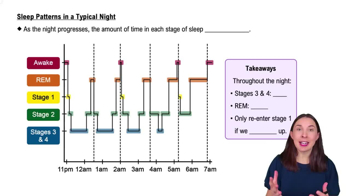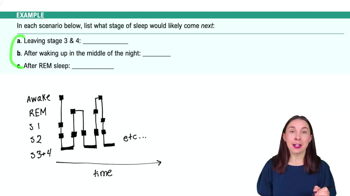Table of contents
- 1. Introduction to Psychology1h 43m
- 2. Psychology Research2h 20m
- 3. Biological Psychology2h 41m
- 4. Sensation and Perception28m
- 5. Consciousness and Sleep32m
- 6. Learning41m
- 7. Memory34m
- 8. Cognition37m
- 9. Emotion and Motivation35m
- 10. Developmental Psychology33m
- 11. Personality48m
- 12. Social Psychology41m
- 13. Stress and Health41m
- 14. Psychological Disorders44m
- 15. Treatment47m
5. Consciousness and Sleep
Sleep
Struggling with Psychology?
Join thousands of students who trust us to help them ace their exams!Watch the first videoMultiple Choice
One way in which the social cognitive view differs from psychoanalytic theory is that it
A
is still in use today.
B
focuses mostly on internal processes.
C
can be and has been tested under scientific conditions.
D
centers on the effects of internal conflicts on personality.
 Verified step by step guidance
Verified step by step guidance1
Begin by understanding the core principles of both social cognitive theory and psychoanalytic theory. Social cognitive theory emphasizes the role of observational learning, imitation, and modeling, while psychoanalytic theory focuses on unconscious processes and internal conflicts.
Consider the historical context and development of each theory. Psychoanalytic theory, developed by Sigmund Freud, was one of the earliest theories of personality and focused on the influence of the unconscious mind. Social cognitive theory, developed by Albert Bandura, emerged later and incorporated elements of behaviorism and cognitive psychology.
Examine the scientific basis and empirical testing of each theory. Social cognitive theory is known for its testability and has been subjected to scientific research and experimentation, which is a key difference from psychoanalytic theory that relies more on qualitative analysis and case studies.
Analyze the focus of each theory. Social cognitive theory centers on observable behaviors and cognitive processes, while psychoanalytic theory delves into internal conflicts and the influence of early childhood experiences on personality development.
Reflect on the contemporary relevance and application of each theory. Social cognitive theory remains widely used in various fields such as education, therapy, and organizational behavior due to its adaptability and empirical support, whereas psychoanalytic theory is less commonly used in its original form but has influenced many modern psychological approaches.

 3:25m
3:25mWatch next
Master Circadian Rhythms with a bite sized video explanation from Hannah Gordils
Start learningRelated Videos
Related Practice


































































































![Race, Genes and IQ Differences | Bret Weinstein [Mini Clip]](https://img.youtube.com/vi/IztL_m3pd70/mqdefault.jpg)



































































































